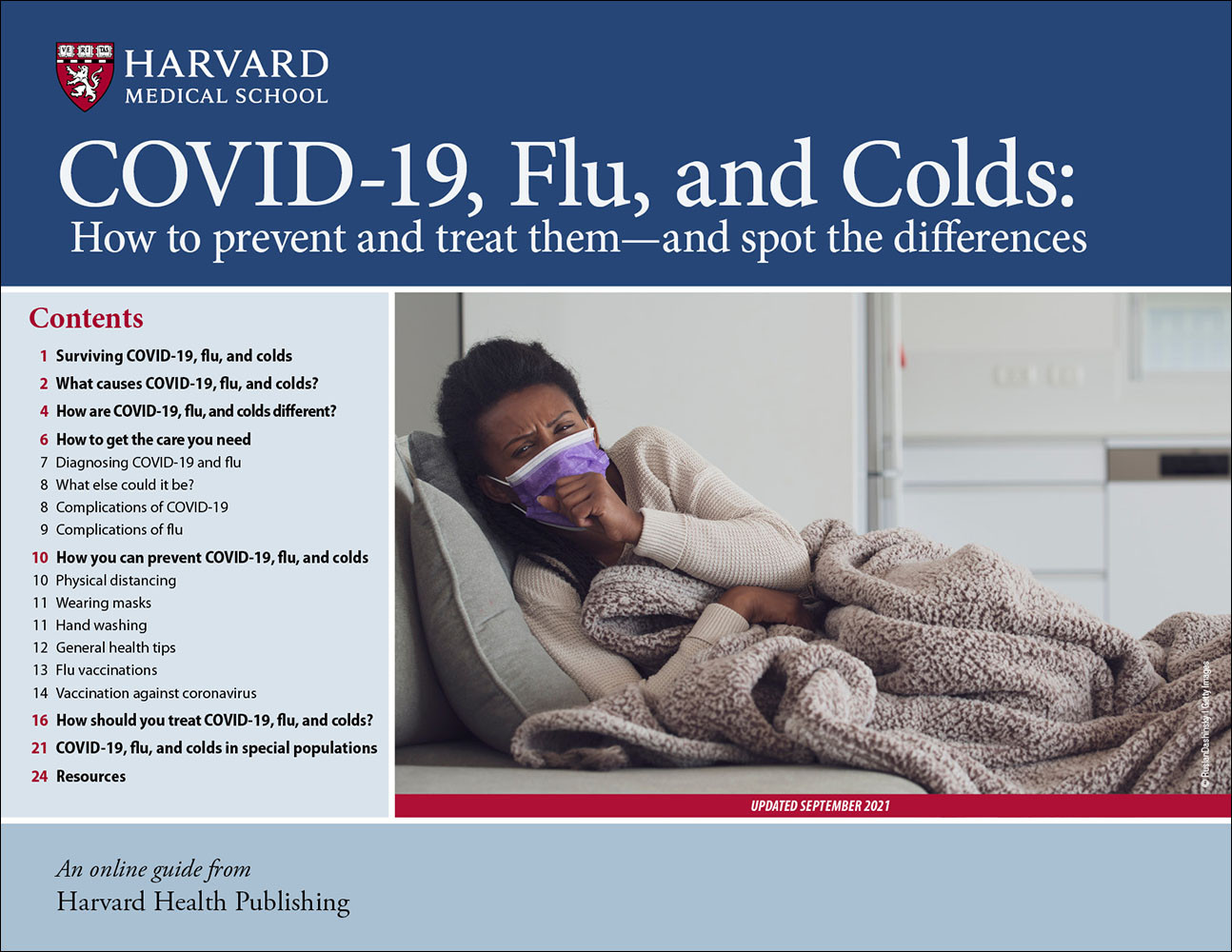Antiviral medications for winter bugs
You don't have to let your body wage war on its own. Here's when you might need help.
- Reviewed by Anthony L. Komaroff, MD, Editor in Chief, Harvard Health Letter; Editorial Advisory Board Member, Harvard Health Publishing

Winter viruses are on the way, and among them are the bugs that cause flu and COVID. Both viruses can be treated with antiviral medications. If you haven’t taken antivirals before, you might wonder if it’s necessary to take them if you become infected now, especially if you’ve previously had COVID or flu. The answer depends on the virus and your age, health, and more.
Which bug do you have?
It can be tough to distinguish between COVID and flu, which have similar symptoms: sore throat, runny nose, headache, fever, chills, and muscle aches and pain. If the infection progresses, you may develop a cough, shortness of breath, and a persistent high fever, which are warnings to seek immediate medical attention.
How can you tell the difference between the two viral infections? “You feel worse faster with the flu, like being hit with a ton of bricks, whereas the onset of COVID can be more subtle. You need to get tested to know which virus you have,” says Dr. Daniel Kuritzkes, chief of the Division of Infectious Diseases at Harvard-affiliated Brigham and Women’s Hospital.
He says you don’t have to go to a medical setting for a flu or COVID test; home test kits available at drugstores can determine which virus you have.
How antivirals can help
Knowing which type of infection you’re dealing with is crucial, because the treatments — available by prescription only — work differently.
The go-to antiviral for people with flu (who are not hospitalized) is oseltamivir (Tamiflu). It interferes with an enzyme that allows the virus to leave one cell and infect others. The drug is taken twice daily for five days and can shorten the duration of symptoms by a day or two. The main side effects are diarrhea and nausea.
The antiviral for people with COVID (who are not hospitalized) is nirmatrelvir/ritonavir (Paxlovid). Nirmatrelvir stops the virus from copying itself and multiplying. Ritonavir makes nirmatrelvir work better. This combination is taken twice daily for five days and can keep COVID from leading to hospitalization. “It’s unclear if the medication makes your symptoms go away faster,” Dr. Kuritzkes says.
The main side effects of Paxlovid are a metallic taste in the mouth (caused by nirmatrelvir) and nausea and diarrhea (caused by ritonavir).
The best candidates for antivirals
While your health care provider must make the call about whether to prescribe an antiviral, Dr. Kuritzkes says several factors put you at greater risk and should prompt you to ask for help as soon as possible, even if you’ve had flu or COVID before: age (65 or older), an impaired immune system, or underlying conditions (especially heart or lung disease).
All of these automatically make you more vulnerable to the viruses, even if you’ve been vaccinated. (Pregnant women also are at increased risk for severe influenza and COVID, and should consider taking an antiviral.)
A gray area
What if you’re healthy, not yet 65, and vaccinated? “You need to have an individual discussion with your health care provider,” Dr. Kuritzkes says. “For example, you have to balance the benefits of therapy with the potential for drug side effects. But they aren’t serious side effects. The drugs are safe and can be stopped if you find the side effects too unpleasant.”
Other considerations include drug costs, which vary by insurance; how quickly you need to get back to work or your activities; the potential for COVID to rebound after taking nirmatrelvir and ritonavir, which is hotly debated; and protecting people around you. “Oseltamivir might protect people in your household from getting the flu,” Dr. Kuritzkes says.
Don’t wait to decide
Your window for an antiviral to be effective is limited — 48 hours from the start of flu symptoms and five days from the start of COVID symptoms. “It’s not harmful to take the medications after that window, but they are less likely to work,” Dr. Kuritzkes says. “Pay attention to a scratchy throat or runny nose, and don’t wait to figure out what’s going on.”
And one more thought to consider: “It’s far better to prevent infection than treat it,” Dr. Kuritzkes says. “Get vaccinated, and take steps to avoid getting sick.”
Image: © juanma hache/Getty Images
About the Author

Heidi Godman, Executive Editor, Harvard Health Letter
About the Reviewer

Anthony L. Komaroff, MD, Editor in Chief, Harvard Health Letter; Editorial Advisory Board Member, Harvard Health Publishing
Disclaimer:
As a service to our readers, Harvard Health Publishing provides access to our library of archived content. Please note the date of last review or update on all articles.
No content on this site, regardless of date, should ever be used as a substitute for direct medical advice from your doctor or other qualified clinician.
















